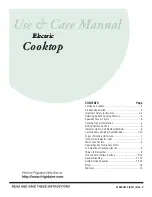
6
Setting Surface Controls
1. Place the pan on the surface element.
2. Push in and turn the surface element control knob to desired setting.
3. The surface signal light will glow when one or more elements are turned on. Always turn
the element off before removing the pan.
The suggested settings found in the chart below are based on cooking in medium-weight
aluminum pans with lids. Settings may vary when using other types of pans.
Note: The size and type of utensil used, and the amount
and type of food being cooked will influence the setting
needed for best cooking results.
Do not place plastic items such as salt and
pepper shakers, spoon holders or plastic wrappings on top
of the cooktop when it is in use.
These items could melt or
ignite. Pot holders, towel or wood spoons could catch fire if
placed too close to the element.
Indicator lights
(coil elements models)
Some models have an indicator light for each heating unit, other models have an indicator light for each pair of heating units,
also some other models have an indicator light for all heating units.
The indicator light glows as soon as a heating unit is turned on. Check if the indicator light glows when the control knob of the
individual heating unit is turned on. If the knob is set to a very low temperature setting, the indicator may glow and yet, the heating
unit may not be heating at all. If this happens, turn the knob to a higher setting until the heating unit comes on.
When cooking is finished, a quick glance at the indicator lights in an easy check to be sure all the control knobs have been turned
OFF.
NOTE: Control knob shown is typical only.
Setting
MAX or HI
MEDIUM
MEDIUM LOW
MIN or 1
Type of Cooking
Start most foods, bring water to a
boil, pan broiling.
Maintain a slow boil, thicken sauces
and gravies, steam vegetables.
Keep foods cooking, poach, stew.
Keep warm, melt, simmer.
1.
Use tested recipes and follow instructions carefully. Check with your local
Cooperative Agricultural Extension Service or a manufacturer of glass jars for the
latest canning information.
2.
Use flat-bottomed canners only. Heat is spread more evenly when the bottom
surface is flat.
3.
Center canner on the surface element.
4.
Start with hot water and a high heat setting to reduce the time it takes to bring
the water to a boil; then reduce the heat setting as low as possible to maintain
a constant boil.
5.
It is best to can small amounts and light loads.
Prevent damage to cooktop:
1.
Do not use water bath or pressure canners that extend more than one inch
beyond the edge of the surface element.
2.
Do not leave water bath or pressure canners on high heat for an extended
amount of time.
3.
Alternate surface elements between each batch to allow the units and
surrounding surfaces to cool down. Try to avoid canning on the same element
all day.
Safe canning requires that harmful micro-organisms are destroyed
and the jars are sealed completely. When canning in a water bath canner, a gentle
but steady boil must be maintained continuously for the required time.
Canning Tips &
Information
Canning can generate
large amounts of steam. Use extreme
caution to prevent burns. Always raise the
lid to vent steam away from you.
Summary of Contents for 318200612
Page 15: ...1 5 Notes ...


































